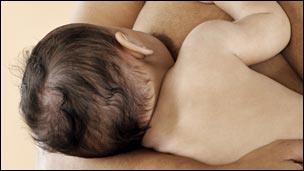Weaning before six months 'may help breastfed babies'
- Published

Breastfeeding is known to benefit babies
Relying purely on breastfeeding for the first six months might not be best for babies, experts in the UK have warned.
In the , the team said breastfed babies may benefit from being given solid food earlier.
Current advice suggests weaning should occur at six months, but the UCL team say it could happen as early as four.
They suggest later weaning may increase food allergies and iron deficiency levels, but other experts backed the existing guidance.
Ten years ago, the World Health Organization published global advice advocating babies be exclusively breastfed for six months.
The research team, led by Dr Mary Fewtrell a paediatrician from the University of London Institute of Child Health, said it supported the recommendation for developing countries, where access to clean water and safe weaning foods is limited, and there is a high risk of infant death and illness.
But they added: "Many western countries, including 65% of European member states and the US, elected not to follow this recommendation fully, if at all.
But in 2003, a health minister said the UK would comply.
Parents 'cannot win'
The WHO recommendation "rested largely" on a review of 16 studies, including seven from developing countries.
It concluded that babies just given breast milk for six months had fewer infections and experienced no growth problems.
But another review of 33 studies found "no compelling evidence" not to introduce solids at four to six months, the experts said.
Some research has also shown that six months of breastfeeding does not give babies all the nutrition they need.
A US 2007 study found there was an increased risk of anaemia compared with those introduced to solids at four to six months.
Swedish research also found that the incidence of early onset coeliac disease increased after a recommendation to delay introduction of gluten until age six months, but fell back after the recommendation reverted to four months.
Dr Alan Lucas, director of the Institute of Health, said: "The WHO recommendation is very sensible for developing countries.
"But in the UK, it's important we take a balanced look at the evidence."
Dr Fewtrell added: "When you look at the figures, there are a lot of babies being weaned before six months anyway - and that's probably the most important thing in terms of hard evidence."
'Inappropriate feeding'
But the Royal College of Paediatrics and Child Health and the National Childbirth Trust defended current advice.
And Janet Fyle, professional policy adviser at the Royal College of Midwives, said: "I really must challenge the suggestion that the UK should reconsider its current advice on exclusive breastfeeding for six months.
"I believe that this is a retrograde step and plays into the hands of the baby-food industry which has failed to support the six-month exclusive breastfeeding policy in the UK.
"There is evidence that some babies do die in developed countries from inappropriate young child feeding, such as the introduction of solid foods earlier before their swallowing mechanism is mature enough or they have fully developed the capability to cope with solid foods."
And a Department of Health spokeswoman said: "Breast milk provides all the nutrients a baby needs up to six months of age and we recommend exclusive breastfeeding for this time.
"Mothers who wish to introduce solids before six months should always talk to health professionals first."
The Scientific Advisory Committee on Nutrition is to review infant feeding and is due to report later this year.
Your emails
What should I do? I have an exclusively breastfed 21 week old baby who I want to do the best for. This is extremely stressful as the evidence is so polarised. I have even received mixed messages from healthcare professionals thus far! Joanne Leaver-Cole, London
When I had my daughter 10 years ago I followed the breastfeeding recommendations religiously. I breastfed exclusively for six months before introducing solids. My daughter is now extremely fussy with what she eats and suffers from food allergies some of which are really rare, for example she is allergic to baked beans. She is also very small for her age. I honestly believe that complying with these guidelines has had a detrimental affect on my daughters health. Karon Grace, Derbyshire
My baby is 10-months-old now, so it's too late to change my habits. I exclusively breastfed him for six months, so today's report is not exactly music to my ears. I would like to add that he seemed perfectly happy not to be weaned any earlier, and he gained weight appropriately. He was born weighing 10 lbs 7.5 oz and continued steadily at the 75th percentile during that time. Jane Haynes, Harrogate, North Yorkshire
I am so tired of hearing health professionals, midwives and health visitors pontificate as to what is best for babies. Every baby is different and every situation is different. I started weaning my two children as soon as they showed an interest in reaching out for solid food. Both wanted solids at 4.5 months old and started on baby rice. Perhaps we should stop listening to blanket guidelines (which cannot possibly be completely correct since they are changed every five minutes) and listen to our babies instead! Joanna Scott, Basingstoke
I think breast feeding is best for the first six months but all babies differ and whilst I didn't give my son solids before six months I did with my daughter so it does depend on the babies individual needs. In all cases of weaning you should consult your doctor or health care worker. Jude, Manchester
- Published14 January 2011
- Published17 December 2010
- Published28 September 2010